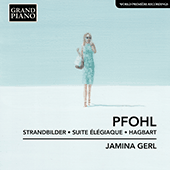 Ferdinand Pfohl: Strandbilder + Suite élégiaque + Hagbart; Jamina Gerl, Klavier; 1 CD Grand Piano GP 784; Aufnahme 11/2016, Veröffentlichung 10/2019 (86’20) - Rezension von Guy Engels
Ferdinand Pfohl: Strandbilder + Suite élégiaque + Hagbart; Jamina Gerl, Klavier; 1 CD Grand Piano GP 784; Aufnahme 11/2016, Veröffentlichung 10/2019 (86’20) - Rezension von Guy Engels
Ferdinand Pfohl war im 19. Jahrhundert ein gefürchteter Musikkritiker, das deutsche Pendant des strengen Eduard Hanslick. Pfohl tat sich aber auch als Pädagoge und Komponist hervor. Die Bonner Pianistin Jamina Gerl hat drei große Klavierwerke Pfohls erstmals auf CD eingespielt.
Die Strandbilder sind eine sehr stimmungsvolle Wanderung durch die Dünen. Jamina Gerl taucht den Zuhörer mit viel Feingefühl in das Rauschen der Meeresbrandung, in aufschäumende Gischt, nimmt ihn behutsam an der Hand auf dem ‘Friedhof der Namenlosen’. Gerade in diesem vierten Satz unterstreicht die Pianistin das typisch romantische Motiv des Wanderers in all seinen Deklinationen und Schattierungen.
Pfohls große Klavierwerke sind symphonisch angelegt, und die Strandbilder wurden später als Meeressymphonie orchestriert. Dies ist nicht der Fall für die über 40-minütige und ebenso symphonische Suite élégiaque, in der Jamina Gerl wunderbar der gärenden Endzeitstimmung an der Wende zum 20. Jahrhundert nachspürt: Endzeitstimmung in politischen aber auch in musikalischen Entwicklungen. Nie geht die Spannung verloren bei der Wechselwirkung zwischen spätromantischer Opulenz und impressionistischer Reduzierung auf das Elementare. Beendet wird das Programm mit Hagbart, einer Nordischen Rhapsodie nach einem Thema von Edward Grieg.
Ferdinand Pfohl was a feared music critic in the 19th century, the German equivalent of Austria’s Eduard Hanslick. But Pfohl also distinguished himself as a teacher and composer. The pianist Jamina Gerl has made world premiere recordings of three of his major piano works.
Strandbilder (Beach Pictures) is a very atmospheric walk through the dunes. Jamina Gerl depicts with great sensitivity the roaring of the sea surf, the sea spray, and takes us gently to the ‘Cemetery of the Nameless’. Especially in this fourth movement, the pianist underlines the typical romantic motif of the wanderer in all its declensions and shades.
Pfohl’s great piano works are in a way symphonic, and the Beach Scenes were later orchestrated as a Sea Symphony. This is not the case for the over 40-minute and equally symphonic Suite élégiaque, in which Jamina Gerl wonderfully traces the fermenting end-time mood at the turn of the 20th century: end-time mood in political but also in musical developments. The tension is never lost in the interaction between late romantic opulence and impressionistic reduction to the elementary. The programme ends with Hagbart, a Nordic Rhapsody on a theme by Edward Grieg.


















